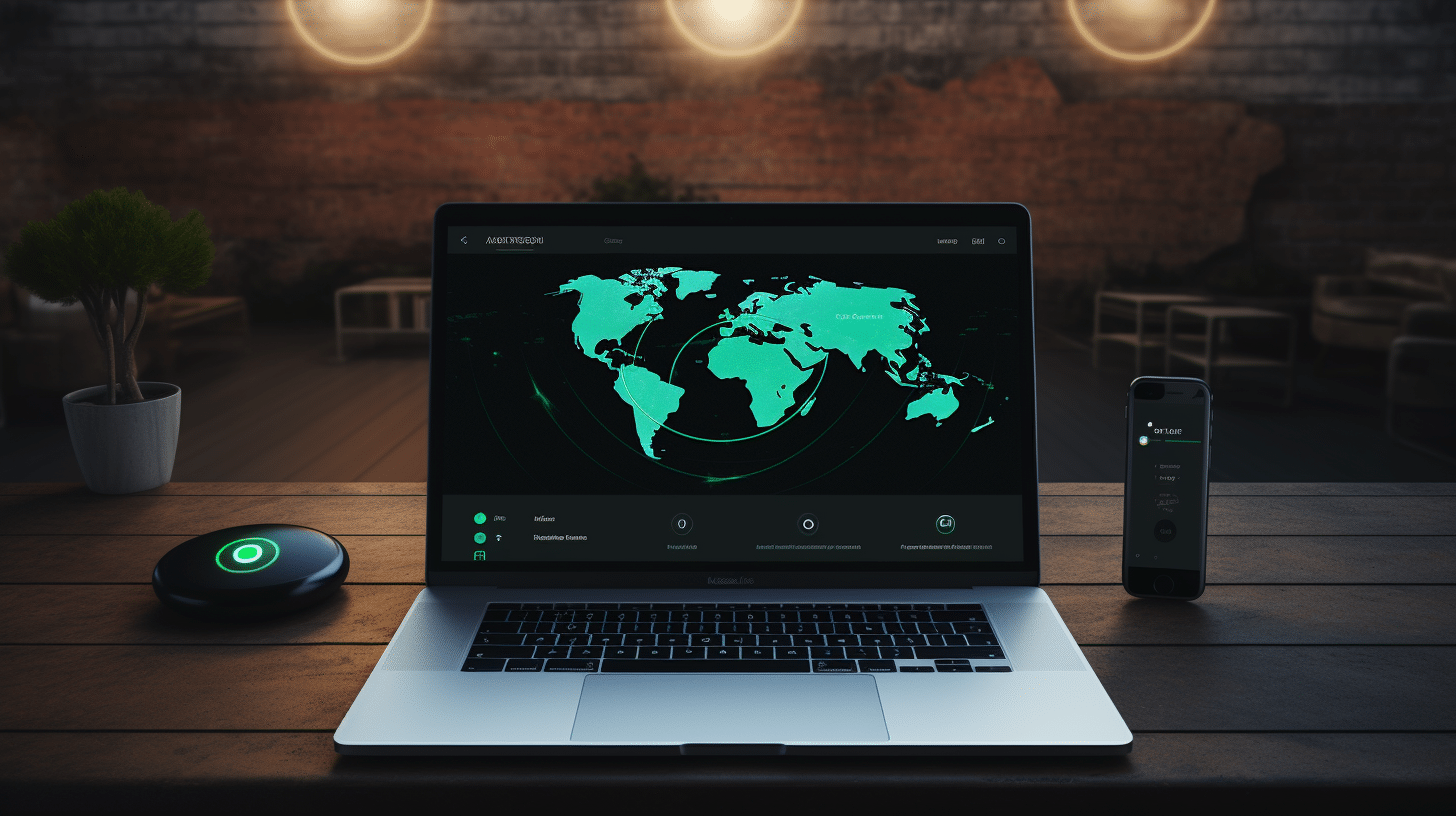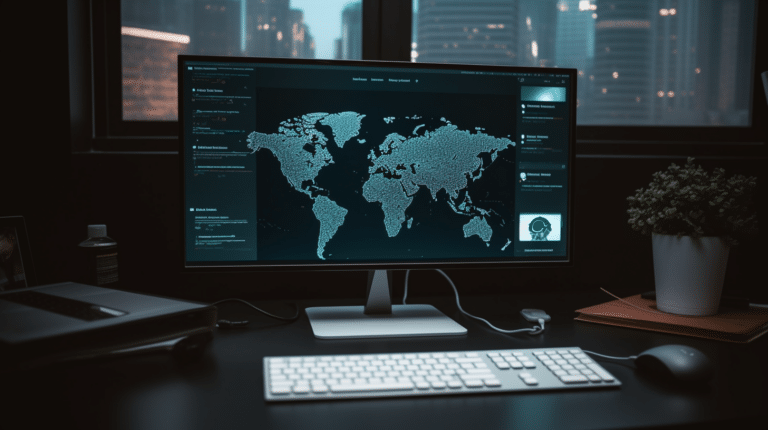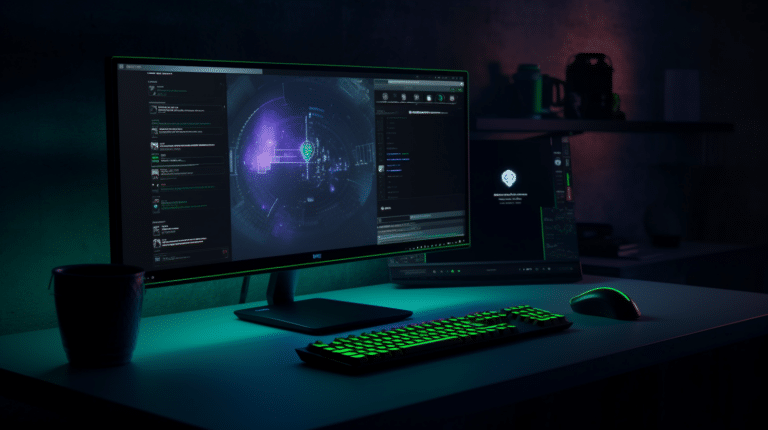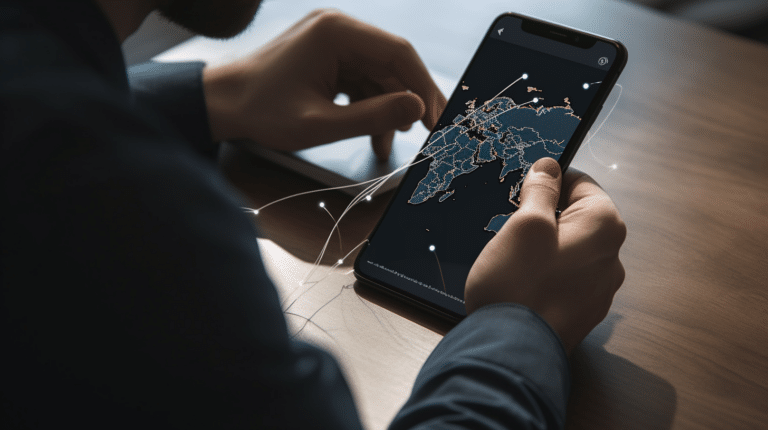A Virtual Private Network (VPN) is a technology that provides a secure and private connection over the internet by creating a virtual “tunnel” between your device and a remote server. VPNs are versatile tools commonly used to enhance online privacy, bypass censorship, and access geo-restricted content by masking your IP address and encrypting data sent over the connection.
While VPNs were initially designed for facilitating secure communication within organizations, they have gained popularity among individual users as a means to safeguard their online activities and protect personal information from hackers and intrusive third parties. Coupled with the growing concerns of digital privacy, VPNs provide an additional layer of defense by routing their users’ internet connections through an encrypted channel to help prevent unauthorized access to their data.
Key Takeaways
- VPNs enhance online privacy by encrypting data and masking user IP addresses.
- They are used to bypass censorship and access geo-restricted content.
- VPNs help protect user data from hackers and third parties by creating a secure connection.
Why Use a VPN?
A Virtual Private Network (VPN) is a valuable tool for many internet users, offering numerous benefits and enhancing their online experience. We will discuss two primary reasons individuals and businesses use VPNs: Privacy and Security, and Bypassing Geo-Restrictions.
Privacy and Security
One of the main reasons users employ a VPN is to protect their privacy and ensure security while using the internet. When connected to a VPN, your internet traffic is routed through an encrypted tunnel, shielding your IP address and making it more difficult for external parties, including your ISP (Internet Service Provider), to monitor your online activity or access sensitive information.
Using a VPN is crucial when accessing public Wi-Fi networks, as it helps prevent eavesdroppers from intercepting your data. Furthermore, it can protect your identity from cybercriminals, hackers, and even intrusive government surveillance.
A VPN provides the following privacy and security benefits:
- Encrypts your internet traffic to safeguard your data
- Hides your IP address, making it difficult for others to track your location
- Protects you from potential threats on public Wi-Fi networks
Bypassing Geo-Restrictions
Another common use case for VPNs is bypassing geo-restrictions imposed by some websites and streaming services. These restrictions limit access to content based on a user’s geographic location, often due to licensing agreements or local regulations.
By using a VPN, you can connect to a server in a different country, masking your true IP address and making it appear as if you are accessing the content from that specific location. This ability to bypass geo-restrictions allows users to enjoy a more open and unrestricted internet experience, as well as access region-specific websites, streaming libraries, and online services that may be unavailable in their home country.
In summary, VPNs offer numerous advantages, including enhanced privacy and security, protection from threats on public Wi-Fi networks, and the ability to bypass geo-restrictions set by websites and streaming services. Choosing to use a VPN can help ensure a safer and more enjoyable online experience.
Types of VPN Protocols
A Virtual Private Network (VPN) is a technology that creates a secure and encrypted connection over a less secure network, like the Internet. VPNs use various protocols to ensure the confidentiality, authentication, and integrity of data in transit. Let’s explore the commonly used VPN protocols, such as IPsec, Microsoft’s SSTP, and Tunneling.
- IPsec (Internet Protocol Security): IPsec is a suite of protocols designed to provide security at the network layer (Layer 3) of the OSI model. It allows the secure exchange of data between systems and networks by encrypting and authenticating transmitted information. Two primary modes are used in IPsec - Transport mode and Tunnel mode. Transport mode encrypts the payload of an IP packet, while Tunnel mode encapsulates the entire IP packet, providing protection for both the payload and headers. IPsec is widely used in site-to-site VPNs and remote access VPNs and is supported by almost all major operating systems.
- Microsoft’s SSTP (Secure Socket Tunneling Protocol): SSTP is a VPN protocol developed by Microsoft that establishes a secure connection over an SSL/TLS channel. It provides data confidentiality, integrity, and authentication. SSTP also supports the use of certificates to avoid potential risks from man-in-the-middle attacks. Being proprietary to Microsoft, SSTP is tightly integrated with Microsoft Windows and works well in scenarios where VPN traffic might be blocked or monitored. However, this protocol may not be compatible with some non-Microsoft devices.
- Tunnelling Protocols: VPNs can use various tunnelling protocols to create secure connections between devices over the internet. Two common tunnelling protocols are PPTP (Point-to-Point Tunneling Protocol) and L2TP (Layer 2 Tunneling Protocol). PPTP is an older protocol developed by Microsoft with weaker security measures, while L2TP is often paired with IPsec for enhanced security. OpenVPN is another popular tunnelling protocol and is known for being highly configurable and offering strong security through SSL/TLS.
In conclusion, different VPN protocols have their own advantages and disadvantages based on factors like security, compatibility, and performance. When selecting a VPN service, you should consider the protocol used and whether it meets your security and compatibility needs.
Features of a VPN
A VPN (Virtual Private Network) is a technology that allows users to securely connect to the internet and protect their online privacy. There are several features that make VPNs desirable for both personal and professional use. In this section, we will discuss four key aspects: Encryption Techniques, Anonymous IP, Kill Switch, and Server Locations.
Encryption Techniques
One of the primary functions of a VPN is to provide a secure connection by encrypting the user’s data. Encryption is the process of encoding information in such a way that only authorized parties can access it. There are various encryption techniques utilized by VPNs, such as AES-256, which is commonly used due to its high level of security and efficiency. By encrypting internet traffic, VPNs prevent unauthorized parties, including hackers and Internet Service Providers (ISPs), from intercepting and viewing sensitive data.
Anonymous IP
Another essential feature of a VPN is providing the user with an anonymous IP address. When connected to a VPN, your internet traffic is routed through a secure tunnel and your real IP address is replaced with one from the VPN server. This effectively masks your identity and location, helping you maintain privacy and avoid being tracked by websites, advertisers, or even your ISP.
Kill Switch
A kill switch is a security feature that automatically disconnects your internet connection if the VPN connection drops. This ensures that your real IP address, online activity, and sensitive data remain shielded even if the VPN experiences temporary disruptions. Not all VPN services offer a kill switch feature, but it has become increasingly popular due to its ability to provide continuous security.
Server Locations
The choice of server locations is another crucial aspect of a VPN service. A vast network of servers spread across different countries allows users to connect to the nearest or most suitable location based on their needs. Accessing a server closer to your physical location generally results in better performance, while connecting to a server in another country can help bypass geo-restrictions and access blocked content. A wide array of server locations also contributes to better privacy, as it enables users to choose from various IP addresses.
VPN Use Cases
A Virtual Private Network (VPN) is a technology that provides a secure and encrypted connection over the Internet. It is commonly used for various purposes on computers, phones, and tablets. In this section, we will discuss some of the most popular VPN use cases, including remote work, online gaming, and accessing video streaming services.
Remote Work
With the increasing trend of remote work, VPNs have become an essential tool for many companies and employees. A VPN allows users to securely access their organization’s resources, such as file servers, email servers, and intranets, from anywhere in the world. This ensures that sensitive data is protected from unauthorized access and cyber-attacks. Additionally, VPNs can also be used to safely share large files and collaborate on documents with colleagues.
Online Gaming
VPNs are popular among gamers for several reasons. First, they can help reduce latency and improve the overall gaming experience by selecting a server closer to the game server. This can be particularly useful for players participating in international gaming competitions or those living in regions with limited server options.
Second, VPNs can enhance security by protecting users from DDoS attacks, which are a common occurrence in the gaming world. Additionally, VPNs enable access to geo-blocked gaming content that might not be available in the player’s region.
Lastly, with the rise of social media platforms like Facebook being used for gaming, some users may choose to use a VPN to maintain their privacy and protect their personal data from potential misuse by gaming companies or marketing partners.
Accessing Video Streaming Services
One of the most popular use cases for VPNs is accessing video streaming services such as Netflix and Hulu. Due to licensing agreements and geo-restrictions, some streaming platforms offer different content libraries depending on the user’s location. By using a VPN, users can change their virtual location and access a wider range of content not available in their home country.
Moreover, some streaming services are completely blocked in certain regions due to strict censorship policies. A VPN allows users to bypass these restrictions and enjoy their favorite shows and movies.
It is important to note that using a VPN to access video streaming services may violate the service’s terms of use, and some platforms actively work to block VPN connections. As a result, users should use caution when employing a VPN for this purpose.
Privacy Concerns with VPNs
Using a VPN service can greatly enhance your online privacy and security. However, it is essential to be aware of the potential privacy concerns when choosing a VPN provider. Not all VPN providers are created equal, and some may collect or share your browsing history and personal data.
One potential issue is that a VPN provider may keep logs of your online activities. These logs can include information such as the websites you visit, the files you download, and your connection timestamps. If a VPN provider retains this information, it could be vulnerable to hackers, government surveillance, or court orders. Therefore, it is crucial to choose a VPN service that has a strict no-logs policy and is transparent about their data handling practices.
Another concern is the security of the VPN server itself. If a VPN server is not properly secured, it may be susceptible to attacks, data breaches, or unauthorized access. This could compromise your personal data and put your privacy at risk. To mitigate this risk, ensure that your VPN provider uses strong encryption and robust security protocols to protect your data in transit and while it is stored on their servers.
Additionally, some VPN providers may sell or share your browsing history and personal data with third parties, such as advertisers or data brokers. This can be an invasion of your privacy, as you may be sharing sensitive information through your VPN connection. Before choosing a VPN service, carefully review their privacy policy and terms of service to confirm that they do not share or sell your data.
Moreover, the location of a VPN provider may also have an impact on your privacy. Some countries require VPN providers to log user data or share information with government agencies. It’s a good idea to choose a VPN service that operates in a jurisdiction with strong privacy protections and is not subject to invasive data retention laws.
In conclusion, while using a VPN can significantly enhance your online privacy and security, it is crucial to be aware of potential privacy concerns and select a reputable VPN provider. Take the time to research and compare different providers, ensuring that they have a strict no-logs policy, robust security measures, and a strong commitment to protecting your personal data and browsing history. This will help you make an informed decision and reduce the risk of compromising your privacy while using a VPN.
VPN Limitations
Effect on Internet Speed
VPNs are known to sometimes have an impact on internet speed. This is because when you use a VPN, your data needs to be encrypted and decrypted, and your traffic is routed through the VPN server. As a result, this extra step can cause a slight decrease in speed, especially if the VPN server is located far away from you. This issue can be addressed by choosing a VPN provider with servers located close to your geographical location or one that is optimized for speed.
Vulnerabilities
Although VPNs are designed to provide security and privacy, they are not immune to vulnerabilities. There have been cases where VPN protocols and encryption methods were found to be susceptible to exploits and attacks. It is crucial to choose a VPN provider that prioritizes the security of its servers and uses up-to-date and strong encryption technologies, such as new approaches for VPN security. In addition, using two-factor authentication can help further secure your VPN account.
Legal Issues
VPNs can sometimes face legal issues related to their use. In some countries, the use of VPNs is either restricted or illegal because they can be used to bypass internet censorship and access geo-restricted content. Additionally, VPNs may also draw the attention of law enforcement agencies if they suspect that a VPN is being used for illegal activities. It is essential to be aware of the legal limitations of using a VPN in your jurisdiction and to always use the VPN for legitimate purposes.
VPNs and Alternative Technologies
A Virtual Private Network (VPN) is a technology used to create a secure and encrypted connection over a public network, such as the internet. VPNs provide a way to alter your apparent location or bypass certain restrictions, protecting your data and privacy in the process. There are various types of VPNs, such as site-to-site VPN, which connects multiple networks in different locations.
Tor is also a popular alternative technology for online privacy and security. Similar to VPNs, Tor routes internet traffic through a network of servers to hide the user’s identity and location. However, unlike VPNs, which use dedicated servers, Tor relies on a decentralized network of volunteer-operated servers.
VPN Traffic differs from regular internet traffic because it is encrypted and passes through a secure tunnel between the VPN client (your device) and the VPN server. This process hides your IP address, making it difficult for outsiders to monitor your online activities or determine your physical location.
Proxies are another technology that can be used to hide your IP address and access blocked content. These servers act as intermediaries, forwarding your requests to the internet and returning the result to you. However, unlike VPNs, proxies do not encrypt your data, and they may lack the level of security and privacy protection that VPNs provide.
When choosing between VPNs, Tor, and proxies, you should consider your specific needs and requirements. Below is a comparison of these technologies:
| Feature | VPNs | Tor | Proxies |
|---|---|---|---|
| Encryption | Yes | Yes | No |
| Privacy | High | High | Low to Moderate |
| Speed | Fast | Slow to Moderate | Moderate to Fast |
| Ease of Use | Easy | Moderate | Easy |
| Access Blocked Content | Yes | Yes | Yes |
In conclusion, VPNs and alternative technologies like Tor and proxies offer varying degrees of privacy, security, and ease of use. It’s essential to understand the differences between these options and evaluate them based on your specific needs and preferences.
Security Tips for Using VPNs
Virtual Private Networks (VPNs) have become essential for maintaining privacy and security while using the internet, particularly in public spaces like airports and hotels. When connecting to public Wi-Fi networks, it is crucial to employ a VPN to ensure a secure and encrypted connection.
A VPN works by creating a secure connection between your device and a designated internet protocol (IP) address, thereby encrypting all your web activity and data transfers. This helps protect you from cybercrime, such as man-in-the-middle attacks, in which an attacker intercepts and modifies your data as it is transmitted over a network.
Here are some security tips for using a VPN:
- Choose a reliable VPN provider: Not all VPNs are created equal. Look for a reputable provider that can guarantee a secure and encrypted connection. Additionally, select a VPN with a strong privacy policy to ensure your data is not shared with third parties.
- Enable HTTPS: While VPNs provide an encrypted connection, it is still important to use HTTPS when browsing the web. HTTPS adds an extra layer of encryption, providing you with additional protection against hackers and data leaks.
- Turn on Two-Factor Authentication (2FA): 2FA adds another layer of security to your accounts. By requiring a second form of verification, it is more difficult for unauthorized users to gain access to your accounts.
- Be mindful of location spoofing: One of the primary benefits of using a VPN is the ability to “spoof” your location, making it appear as if you are in a different geographical area. While this can be helpful for bypassing geo-restrictions, it can also expose you to location-specific threats. Ensure you use location spoofing wisely and research potential risks before using this feature.
- Use a VPN with minimal lag: Poor VPN connections can lead to slow data transfer speeds and increased latency. Look for a VPN with a large network of proxy servers and a reputation for minimizing lag, ensuring a smooth and secure browsing experience.
By following these security tips, you can make the most of your VPN usage, protect your privacy, and mitigate risks associated with public Wi-Fi networks and cybercrime.
Frequently Asked Questions
How does a VPN enhance online privacy?
A VPN, or Virtual Private Network, enhances online privacy by creating a secure and encrypted connection between your device and the internet. This tunnel-like connection protects your online activities from being monitored or intercepted by third parties such as hackers, advertisers, or government agencies. By masking your IP address and location, a VPN helps maintain anonymity and makes it more difficult for others to track your online behavior.
What are the main privacy advantages of using a VPN?
Using a VPN has several key privacy advantages. Firstly, it encrypts your internet traffic, making it difficult for anyone to intercept and decipher your data. Secondly, it hides your IP address and location, providing anonymity online and preventing websites from tracking your activities. Lastly, a VPN can help block ads and prevent trackers from collecting information about your browsing habits and preferences.
How can a VPN improve security on public Wi-Fi?
Public Wi-Fi networks are notoriously insecure, making it easy for hackers to intercept your data and steal sensitive information. A VPN safeguards your data by encrypting it, thus preventing unauthorized access to your personal information, even on public networks. By using a VPN, you can browse safely and with confidence, knowing your sensitive data is protected.
What are the benefits of a VPN for bypassing geo-restrictions?
A VPN can help bypass geo-restrictions by allowing you to connect to servers in different locations, which makes it appear as though your internet traffic is originating from that location. This can be useful for accessing content that is unavailable or blocked in your region, such as streaming services or news websites. By changing your virtual location, you can enjoy content from around the world without physical limitations.
How does a VPN help prevent ISP tracking?
Internet Service Providers (ISPs) can monitor and log your online activities, which can include your browsing history, streaming habits, and even the time spent online. VPNs help prevent ISP tracking by encrypting your data and hiding your IP address. This means your ISP cannot see the websites you visit or the content you access, thus preserving your privacy and preventing them from selling your information to advertisers or other third parties.
Can a VPN be used to access blocked websites?
Yes, a VPN can be used to access blocked websites by allowing you to connect to a server in a different location, which effectively unblocks those sites. As your IP address and location are masked, you can circumvent firewalls or restrictions imposed by governments, workplaces, or schools. This feature is particularly useful in regions with strict internet censorship or when attempting to access region-restricted content.
Conclusion
VPNs are a vital tool for enhancing security and privacy in the digital age. They provide an essential layer of protection by encrypting data and hiding the true IP address of the user. This increased level of anonymity can be particularly useful for individuals operating in countries with strict internet surveillance or seeking to bypass geographic restrictions.
For corporations and businesses, VPNs offer numerous advantages, including the ability to connect remote employees securely to the company network. This allows for greater flexibility in working arrangements and ensures the integrity of sensitive information while being transmitted over public networks. Furthermore, corporations can also benefit from VPNs to facilitate secure site-to-site connections for branch offices, reinforcing network security across all locations.
Governments and government agencies increasingly rely on VPN technology to maintain secure communication channels and protect sensitive information. In a world where cyber threats are constantly evolving, utilizing VPNs ensures the highest level of defense against potential breaches, safeguarding vital national interests.
In summary, VPNs serve as the backbone of secure and private internet communications in various contexts. From enhancing personal privacy to strengthening corporate and government networks, VPNs are indispensable in promoting online safety and anonymity in an ever-changing digital landscape.






